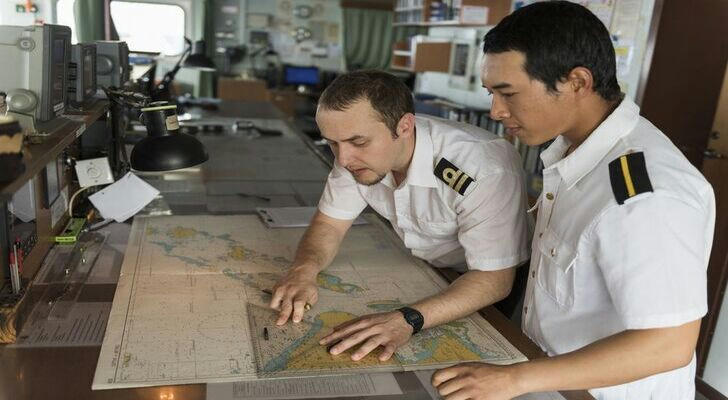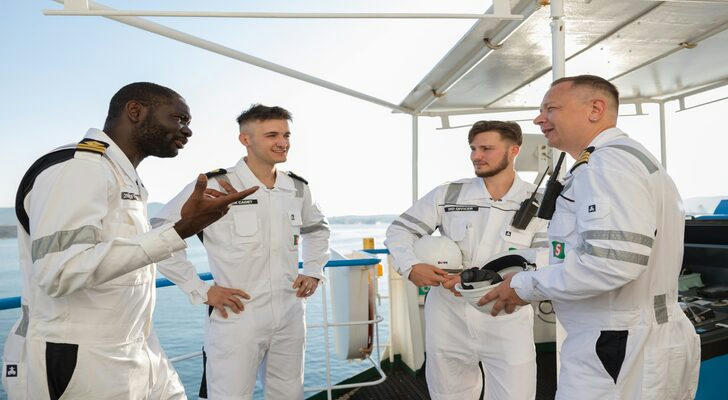Maritime Officer Training
Are you passionate about ships and the sea? If so, a career as a maritime officer might be the perfect fit for you. This profession requires certification in both navigation and engineering skills, which can only be obtained through specialized maritime officer training.
Choosing a career in maritime operations is both rewarding and challenging, especially for those aspiring to become maritime officers. The United States is home to several prestigious maritime academies that offer comprehensive training programs designed to equip students with the skills and knowledge needed for successful careers in the maritime industry. Let’s explore how far you can go in this exciting field. Below are some of the best Maritime Officer Training programs in the U.S., along with insights into their unique features, curricula, and suitability for prospective students.

United States Merchant Marine Academy (USMMA), Kings Point, New York
Established in 1943, the USMMA is a federal service academy offering a rigorous three-year program leading to a Bachelor of Science degree in Marine Engineering, Marine Transportation, or Logistics and Intermodal Transportation. Admission is highly competitive and requires a congressional nomination. The curriculum focuses on maritime law, navigation, engineering, and leadership, with students gaining hands-on experience aboard the academy’s training ship, the TS Kings Pointer.
Key Features:
- Commitment to national defense: Graduates must serve in the U.S. Merchant Marine or armed forces for at least five years.
- Intensive curriculum with a focus on practical training.
Pros:
- Strong emphasis on leadership and technical skills.
- Prestigious reputation and federal affiliation.
Cons:
- Military-style discipline may not suit everyone.
- Highly competitive admission process.
Suitability: Ideal for students seeking a structured, service-oriented career path.
United States Naval Academy (USNA), Annapolis, Maryland
Renowned for its naval architecture and ocean engineering programs, the USNA prepares midshipmen to become officers in the U.S. Navy and Marine Corps. The four-year program culminates in a Bachelor of Science degree, with graduates entering service as ensigns or second lieutenants.
Key Features:
- Emphasis on engineering, mathematics, and leadership.
- State-of-the-art facilities, including advanced laboratories and simulation technologies.
Pros:
- Prestigious education with strong career prospects.
- Hands-on training and research opportunities.
Cons:
- Requires a commitment to military service.
- Highly competitive admissions process.
Suitability: Best for students committed to a military career in the Navy or Marine Corps.
Massachusetts Maritime Academy (MMA), Buzzards Bay, Massachusetts
Founded in 1891, MMA is the second oldest state maritime academy in the U.S. It offers degree programs in marine engineering, marine safety, and environmental protection. The four-year program combines classroom instruction with practical training aboard the training ship, TS Kennedy.
Key Features:
- Strong focus on safety and environmental stewardship.
- Hands-on training in a real-world maritime environment.
Pros:
- Ideal for students interested in sustainable maritime practices.
- Smaller class sizes for personalized attention.
Cons:
- Limited extracurricular opportunities compared to larger universities.
Suitability: Great for students passionate about environmental protection and safety in maritime operations.

Texas A&M Maritime Academy, Galveston, Texas
Part of Texas A&M University, this academy offers a Bachelor of Science degree in Maritime Administration and Marine Engineering Technology. The program combines academic coursework with practical training, including three summer sea terms aboard the training vessel, TS General Rudder.
Key Features:
- Located on the Gulf Coast, providing ample hands-on training opportunities.
- Regimented lifestyle with a focus on discipline and leadership.
Pros:
- Strong industry connections and real-world training.
- Access to a vibrant maritime environment.
Cons:
- Regimented lifestyle may not appeal to all students.
Suitability: Ideal for students seeking a disciplined, hands-on learning experience.
California State University Maritime Academy (Cal Maritime), Vallejo, California
Cal Maritime offers a Bachelor of Science degree in various maritime disciplines, including marine transportation and marine engineering. The program combines theoretical knowledge with practical training aboard the training ship, TS Golden Bear.
Key Features:
- Located on the West Coast, providing access to major shipping routes and ports.
- Comprehensive curriculum with a focus on maritime operations.
Pros:
- Unique training opportunities in a strategic location.
- Strong emphasis on both theory and practice.
Cons:
- High cost of living in California.
Suitability: Best for students looking for West Coast opportunities and a balanced academic-practical approach.
Maine Maritime Academy (MMA), Castine, Maine
MMA offers degree programs in marine engineering and marine transportation, with a strong emphasis on hands-on training. Students spend significant time aboard the training ship, TS State of Maine.
Key Features:
- Focus on engineering and technical skills.
- Remote location with a close-knit community.
Pros:
- Excellent for students interested in engineering careers.
- Strong emphasis on practical training.
Cons:
- Remote location may not appeal to everyone.
Suitability: Ideal for students seeking a focused, technical education in a quiet setting.
Maritime College – State University of New York (SUNY Maritime), Bronx, New York
SUNY Maritime offers a Bachelor of Science degree in marine transportation, marine engineering, and other maritime-related fields. The program combines classroom instruction with practical training aboard the training ship, TS Empire State VI.
Key Features:
- Proximity to New York City, providing unique networking opportunities.
- Diverse maritime industry access.
Pros:
- Strong industry connections and urban advantages.
- Comprehensive curriculum with practical training.
Cons:
- Urban setting may not suit students seeking a traditional college experience.
Suitability:
Great for students looking for urban opportunities and industry networking.
Things to Consider
When choosing a Maritime Officer Training program, prospective students should consider the following factors:
- Career Goals and Interests: Align your aspirations with the program’s focus, as different academies emphasize various aspects of maritime operations.
- Location: Consider the academy’s location, as it can impact the cost of living and the availability of hands-on training opportunities.
- Admission Requirements: Evaluate the competitiveness of the application process and ensure you meet the criteria.
- Program Structure: Look for programs that balance theoretical knowledge with practical training.
- Commitment: Be prepared for the demands of a regimented lifestyle, especially at military-affiliated academies.
- Cost and Financial Aid: Consider tuition fees, living expenses, and available financial aid options.
- Networking Opportunities: Choose programs with strong industry connections and alumni networks.
By carefully evaluating these factors, you can select a Maritime Officer Training program that aligns with your career goals and sets you up for success in the maritime industry. All aboard!
